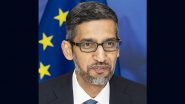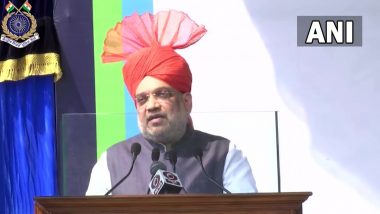New Delhi, April 21: Terrorism is the biggest form of human rights violation and action against terrorism cannot be contradictory to human rights, Union Home Minister Amit Shah said on Thursday. Addressing the 13th foundation day of the National Investigation Agency (NIA) here, Shah said strong action has been taken against terror funding in Jammu and Kashmir and against those who had helped terrorism and were living respectfully in society.
Terrorism is the biggest curse for the society, he said, adding that if there is any country which bore the maximum brunt of terrorism, it is India. "I have some differences with human rights organisations. Whenever there is an anti-terror action, some human rights groups come forward to raise the issue. But I strongly believe that there cannot be a bigger human rights violation than terrorism. It is the biggest form of human rights violation.
"Action against terrorism cannot be contradictory to human rights. It is absolutely necessary to root out terrorism to protect human rights," Shah said amid an applause from officers of the NIA and other security organisations. The home minister said the Narendra Modi government has adopted a zero-tolerance policy towards terrorism and was working to root out the menace from India. Pramod Sawant Meets Amit Shah in His First Visit to Delhi After Govt Formation.
He said the NIA had registered terror funding cases and these cases helped to a great extent to root out terrorism from Jammu and Kashmir. Shah said that earlier, there was no proper action against terror funding. In 2018, cases were registered against terror funding for the first time, and because of that, there is no smooth road for funding terrorism in Jammu and Kashmir, he added.
"In 2021-22, the NIA registered many cases which helped in destroying sleeper cells in Jammu and Kashmir. It has taken strong action against the logistics and supply chain and those who had helped terrorism and were living respectfully in society. They were exposed by the NIA and brought to justice. This is a big thing," he said.
In Jammu and Kashmir, fighting against terrorism and terrorists is one thing and action taken to root out terrorism is another thing, Shah said. "We have to root out terrorism from Jammu and Kashmir. So, we have to destroy the mechanism of terror funding. Because of the terror funding cases of Jammu and Kashmir registered by the NIA, it has become very difficult now to provide funds for terror acts there," he said.
The home minister said there is a realisation worldwide that without India, no goal can be achieved -- be it with regards to environment, economic growth, equal development or ending terrorism. Without India, such goals cannot be achieved, and hence, it is absolutely necessary to ensure and strengthen the country's internal security mechanism, he said.
"The prime minister has set a target of a USD 5 trillion economy for India. To achieve this goal, it is necessary to ensure the country's internal security," Shah said. The minister said the 2008 Mumbai terror attack was an incident which necessitated reforms in institutions.
The NIA was formed after the Mumbai attacks, and all agencies became active against terror funding. There have been positive changes in anti-terror organisations, intelligence agencies and intelligence gathering mechanism, he said. Lauding the NIA's role in the last 13 years, the home minister said the agency should take some pledges for the next 25 years (Azadi ka Amrit Kaal) and efforts should be made so that successes could be achieved on them.
"Success is a good thing. But it is important how this success takes any organisation forward. If success gives encouragement, the organisation goes further. The NIA must consolidate and institutionalise its successes. Unless the successes are consolidated and institutionalised, the NIA will not be successful in its mission," he said.
Shah also referred to sporadic protests that erupted in some places after the NIA took action, and said that without protests, real success cannot be achieved. He also advocated sharing of information, intelligence and other data among law enforcement agencies to check terrorism, crime and criminals.













 Quickly
Quickly




















